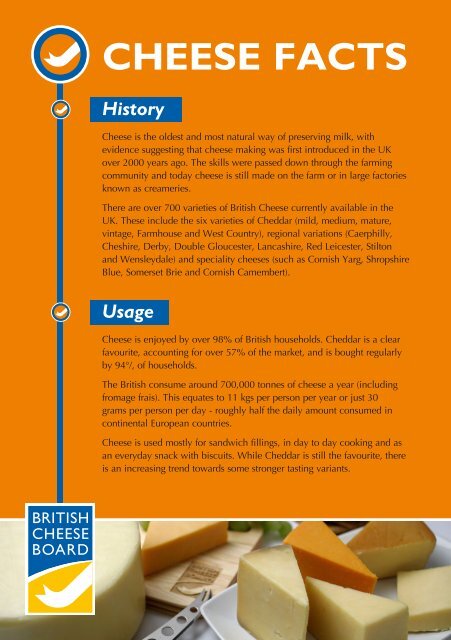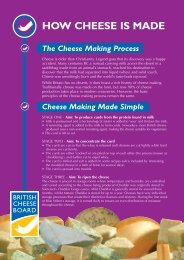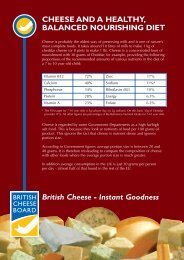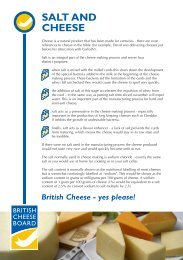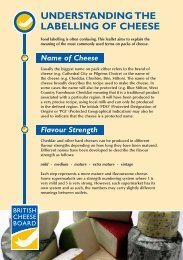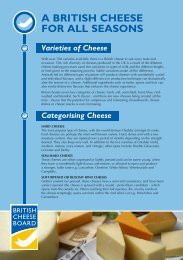CHEESE FACTS - British Cheese Board
CHEESE FACTS - British Cheese Board
CHEESE FACTS - British Cheese Board
- No tags were found...
Create successful ePaper yourself
Turn your PDF publications into a flip-book with our unique Google optimized e-Paper software.
<strong>CHEESE</strong> <strong>FACTS</strong><br />
History<br />
<strong>Cheese</strong> is the oldest and most natural way of preserving milk, with<br />
evidence suggesting that cheese making was first introduced in the UK<br />
over 2000 years ago. The skills were passed down through the farming<br />
community and today cheese is still made on the farm or in large factories<br />
known as creameries.<br />
There are over 700 varieties of <strong>British</strong> <strong>Cheese</strong> currently available in the<br />
UK. These include the six varieties of Cheddar (mild, medium, mature,<br />
vintage, Farmhouse and West Country), regional variations (Caerphilly,<br />
Cheshire, Derby, Double Gloucester, Lancashire, Red Leicester, Stilton<br />
and Wensleydale) and speciality cheeses (such as Cornish Yarg, Shropshire<br />
Blue, Somerset Brie and Cornish Camembert).<br />
Usage<br />
<strong>Cheese</strong> is enjoyed by over 98% of <strong>British</strong> households. Cheddar is a clear<br />
favourite, accounting for over 57% of the market, and is bought regularly<br />
by 94°/, of households.<br />
The <strong>British</strong> consume around 700,000 tonnes of cheese a year (including<br />
fromage frais). This equates to 11 kgs per person per year or just 30<br />
grams per person per day - roughly half the daily amount consumed in<br />
continental European countries.<br />
<strong>Cheese</strong> is used mostly for sandwich fillings, in day to day cooking and as<br />
an everyday snack with biscuits. While Cheddar is still the favourite, there<br />
is an increasing trend towards some stronger tasting variants.
Nutritional Value<br />
<strong>Cheese</strong> provides a number of nutrients. A 30 gram portion of Cheddar<br />
for example contains about 10 grams of fat, 7.5 grams of protein, 222<br />
mg of calcium and 125 calories plus phosphorus and Vitamin B12.<br />
The calcium in cheese is well absorbed by the body, where it helps<br />
with the development and maintenance of strong bones and teeth.<br />
A calcium rich diet plays an important role in helping to prevent<br />
osteoporosis.<br />
Storing and Serving <strong>Cheese</strong><br />
<strong>Cheese</strong> should always be stored in a cool environment (5°C - 10°C)<br />
- the bottom of the refrigerator is best. It should be wrapped tightly in<br />
foil or stored in an air tight container to prevent it drying out. Most<br />
cheeses do not freeze well. The exception is Stilton which should be<br />
wrapped in foil or cling film and can be kept for up to three months.<br />
Defrost slowly in the fridge overnight.<br />
To bring out the true flavour and aroma of cheese, it should always<br />
be served at room temperature. Take it out of the fridge at least two<br />
hours before serving and leave loosely wrapped, until ready.<br />
<strong>British</strong> <strong>Cheese</strong> - yes please!<br />
The <strong>British</strong> <strong>Cheese</strong> <strong>Board</strong> aims to increase consumption of cheese made by its members and provides<br />
information about cheese as part of a balanced diet.<br />
What are the benefits of eating cheese<br />
• Hard cheese contains essential nutrients - protein, calcium, phosphorus and vitamin B12<br />
• It is versatile and convenient to use as part of any meal occasion<br />
• There are more than 700 named cheeses now produced in the UK alone<br />
The <strong>British</strong> <strong>Cheese</strong> <strong>Board</strong> was formed in 1997 and its members account for the majority<br />
of cheese made in the UK.<br />
For further information on the <strong>British</strong> <strong>Cheese</strong> <strong>Board</strong> and its members and the cheeses they produce go<br />
to www.britishcheese.com or e-mail us at enquiries@britishcheese.com Published April 2010


